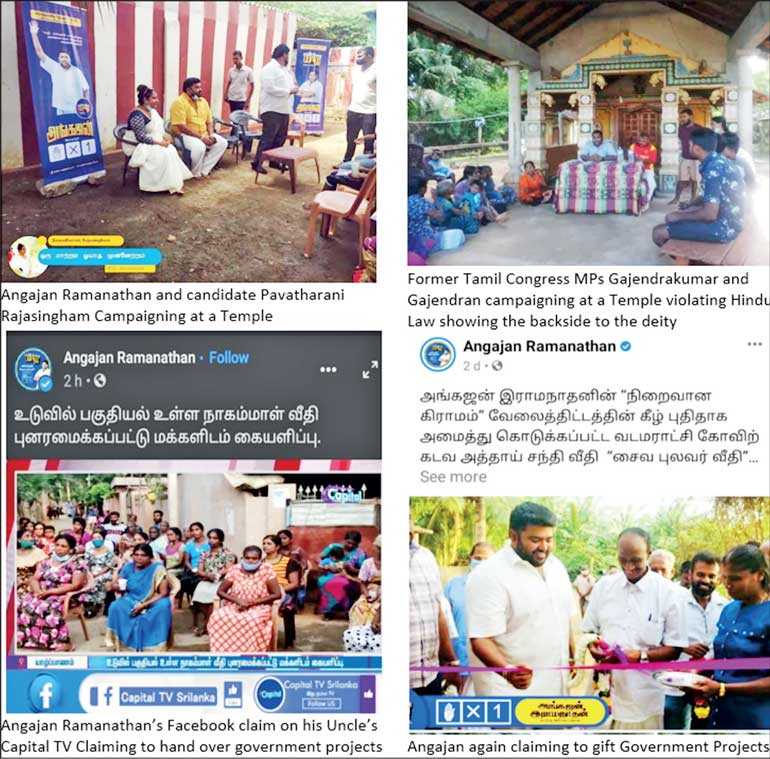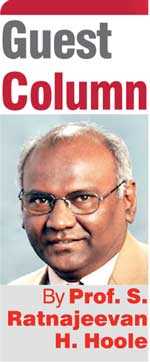Wednesday Feb 18, 2026
Wednesday Feb 18, 2026
Saturday, 11 July 2020 00:10 - - {{hitsCtrl.values.hits}}

Our franchise stolen: Totally lawless 2020 elections?
 Unacceptably intrusive
Unacceptably intrusive
Elections are soon due in the Syrian Arab Republic, Sri Lanka, Belarus, Montenegro, Iran and New Zealand.
From responses solicited by ACE, the Electoral Knowledge Network (with several heavy-weight affiliates like the UNDP, IFES, etc.), most of the experts are in agreement that the military in an electoral process should be used sparingly; limited to security issues and not interfere in the electoral process. It is also important that voters and other stakeholders have sufficient trust in the military if their role is to be seen as legitimate.
Several experts also stress that where the military is employed in an electoral process, it is imperative that it falls under the command of the electoral management body (EMB). The example of the 2006 Venezuelan presidential election is given as one where there was friction over the chain of command and soldiers did not always follow civilian orders as they should have.
Although the military was used extensively in the 1994 South African elections, no norms for its use were established by the Independent Electoral Commission. One practitioner sees the Bangladeshi military’s leading role in a massive voter registration effort as justified because of its unparalleled logistical capacity and good reputation.
Writing of ‘Election as Warfare: Militarization of Elections and Nigeria’, Dr. Azeez Olaniyan and Olumuyiwa Babatunde Amao of Ekiti State University and University of Otago, respectively, have an important paper in International Affairs Forum (Spring 2015). They state that one major issue emerging from the governorship elections conducted in the Ekiti and Osun States of Nigeria is the presence of heavy security forces during their conduct.
Platoons of security operatives, including military officers, were drafted to lock down the states shortly before, during and immediately after the elections. It had immediate consequences on peoples’ rights and freedom. Members of the opposition were specifically targeted. They submit that the deployment of the armed forces for the maintenance of law and order during elections cannot be legally justified.
They further recommend that the government should consider strengthening the capacity of its police units to discharge its constitutional role of ensuring internal security in the country, particularly during the conduct of elections, which are largely civic by nature and orientation.
Sri Lanka’s stand: Trust and legitimacy
We and New Zealand can boast the longest experience in elections among the countries where elections are due soon.
During the local government elections, the Army was deployed extensively in the North and a bit less elsewhere. The EC, unlike in South Africa, firmly stated that the police should do all security work and informed the then President so. After some delay, a day or two before polling the President withdrew the army and the vacuum was filled by the police. The elections went ahead peacefully.
Trusting the military
Further, during Commission deliberations, it became evident that there is little trust in the military or faith in the legitimacy of its role in elections. Among Tamils there is widespread mistrust in and fear of the forces, even the police. This is evident in how the EC’s Tamil and Sinhalese drivers deal with the police when stopped. After the killings of Tamils (over 40,000 by the UN and over 100,000 by friends who lived through it) Tamils fear the armed forces. Recognising the reluctance of Tamils to argue with Sinhalese when there are violations, as a matter of policy the Commission is deliberately ensuring that Sinhalese election officials and remarkably brave Tamil officials are deployed during elections to expected trouble-spots in the North-East.
Most notable is a particular Tamil official who effectively obstructed mischievous ministers and politicians during provincial elections in 2013. There is a determined campaign to ensure that he is put under a cloud by writing complaints against him. When tracked, the complainants are not found at the addresses given. The charge that he was selling cement permits and curfew passes fell flat when no pass could be traced to him and his family shop was found to be not dealing with cement. That is the nature of those who were stopped in their track when they used the government machinery to cheat the people in 2013.
A new president, a new election, re-experiencing 2013
We are facing a Parliamentary Election now under a new president. We are returning to 2013 when monitors warned “the systematic misuse of state resources to benefit pro-government candidates, and the deliberate violation of election law through combining development activities with election campaigning have irreparably flawed the democratic process.” We seem set to relive those hellish times as those with the rulers and helping them split votes ignore laws, sure of impunity.
Being a military man, our new President inducted the military even for traffic regulation in Colombo. Many unthinkingly found it praiseworthy since even in Colombo motorists obeyed the Army; little realising the doors they were thereby opening widely to the detriment of our democracy.
An English daily reported: “Constitutional Council Member Constitutional Council member, Javed Yusuf, [on 8 July] threw his weight behind a fresh initiative by civil society grouping, Freedom: People’s Collective Project, to prevent the ruling SLPP from securing a two-thirds majority to abolish the 19th Amendment to the Constitution.”
As expected, the deployment of the military, especially in the North, expanded rapidly. Member of Parliament Shanthi Sriskantharasa, has complained to GA/Jaffna at a public meeting that intelligence personnel are visiting the homes of candidates and asking them where they are travelling to and where their meetings are scheduled. In law, a candidate has to inform the police only if using a loudspeaker but Tamil candidates are scared to tell this to the intelligence personnel interrogating them.
While intelligence personnel are so bullying Tamil candidates, the Army has put up check-points everywhere. Our EC officers have immense authority, but even they are allegedly stopped by the Army and their vehicles examined. Our ACE for Kilinochchi, a new recruit, was stopped twice on 5 July and was forced by soldiers to open his motor-car dicky twice. He grumbled to friends but when reporters questioned him, he denied it in fear. I have verified from two sources that it happened twice on Sunday 5 July 2020 on the road from Batticaloa to Kilinochchi.
That is how fear grips Tamil election officers. Many Tamil officials when complaints are taken to them respond with empty excuses like there is no proof when proof is offered to them, no action can be taken about Facebook posts, getting election material blessed at a temple is private worship, etc.
Our system-integrity depends on our brave officers like K. Kandeepan (ACE, Mullaitivu) who on his own initiative is going about taking photos and filing complaints; and our J. Jeniton (ACE Mannar). A night ago, Mannar MP Charles Nirmalanathan’s vehicle was travelling in Mullaitivu District carrying little pocket-cards advertising him to be given to voters. They are legitimate; only posters are prohibited. The military stopped the vehicle and confiscated the cards.
Nirmalanathan has pluck. He did not walk away calling the soldiers Sir as I see many high-ranking Tamils doing. He called up Jeniton, who told the Army that such work is the job of the Police and not the military. The Police got involved and asked for the illegally confiscated cards to be returned. The EC Chairman promised me a commendation to Jeniton.
Increasing lawlessness
On Wednesday 17 June the Commission met President Rajapaksa. Two key promises he made are that the Army would not be deployed and instead the Police would be used, and that medical COVID-19 guidelines would be gazetted. Neither has happened. Nor have we received the meeting minutes. Is this Venezuela 2006 again? Are soldiers not obeying our civilian President?
On such cues, political parties that do not heed the law are going to town throwing the laws to the winds. Jaffna GA N. Vedanayahan was transferred a few months short of elections and his retirement. He simply retired rather than put up with the indignity. About 10 GAs were moved just before these elections without good reason, many believe for a collateral purpose. In a major district, complaints are ignored. When goods gifted for COVID-19 shelters were taken over by a former SLFP MP to be distributed as from him, there was an inquiry. The newly imposed Returning Officer certified a cooked up register of beneficiaries to the donors. He then certified to our Inquiry Team that “As far as [his] knowledge is concerned, he is firmly stating after confirmation that everything was done honestly by his different levels of officers.”
After that, how can the inquiry team say in its report that the GA handed over the responsibility to his officers who then played out the donors? Would anyone say this at an inquiry challenging his integrity? When he knows there are allegations against him and an inquiry is on, how can he make such a statement unless it is to cover up? The Returning Officer was sent by powerful authorities to do a job. Who will fearlessly stand up against that?
As a senior Deputy Commissioner explained, “We have a car which we use to transport our children to school, etc. If we are suspended, our world is turned upside down without a car. So we comply with political orders. Our inquiries favour the authorities.”
The system has got so irreparably corrupt that even the money generously given to conduct elections is being swindled. This is a recent complaint I received.
Typical postal mail I get states: “Bladdy tamil dog. Get out my country. I am Sri lankan.” The game is to get us not to vote; to stop me from doing my job.
We must never vote for those resorting to this rowdyism.
The writer is a member of the Elections Commission. The opinion expressed is his own and not necessarily reflective of the Commission.